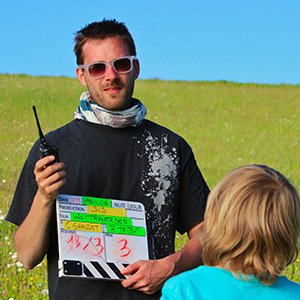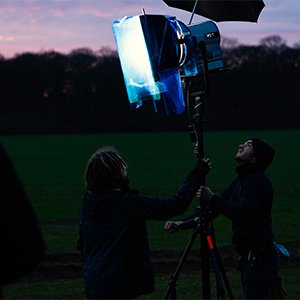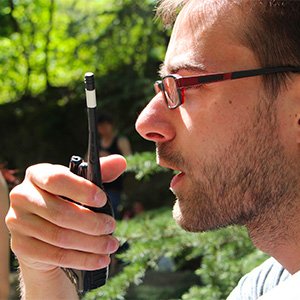Menu
French as a Foreign Language
FILMMAKING & AUDIOVISUAL (in English)
Sound & Music (in English)




Our Master in Recording and Music Production is aimed at international students who are fluent in English and hold a Bachelor’s degree, preferably in music or sound techniques, or in another field but with a keen interest in creative industries.
The program trains students to a high level of competence in sound techniques and music or sound projects management: following this training, our graduates have the skills to design, promote and deliver album, radiophonic, studio and festival projects and to manage a team of sound technicians.
STUDY PROGRAM
1st year
Learn & Repeat
Students take part in team projects while also following modules in technical education and artistic culture.
2nd year
Personal Project
Students work as project managers, managing a personal project and directing a team made up of students from all other sectors. They produce a full artistic and technical file.
Students have the benefit of personalized, one-to-one instruction from a tutor working in the same field as they intend to work : Sound engineer, Sound designer.
Individual monitoring of a personal project each year enables them to develop their professional project which forms the core element of their training.
At a glance
NEXT INTAKE
October 2024
DURATION
2 academic years
ELIGIBILITY
Bachelor’s degree
or equivalent
LANGUAGE
English
TUITION FEES
€14,800 per year
APPLICATION DEADLINE
STUDENTS INTAKE
25 students
PROJECTS
This training forms part of the DNA of 3iS, namely learning by project. During their 2 years of training, Master of Fine Arts students have the opportunity of working with the support of other English-speaking 3iS programs, as well as recognized professionals. They will thus complete the following projects:
PROJECTS
This training forms part of the DNA of 3iS, namely learning by project. During their two years of training, students produce their ideas independently as class groups :
PROFESSIONAL PROJECT
Each year, students who have successfully completed the program receive 60 ECTS (European Credit Transfer and accumulation System) for a total of 120 credits over the three years.
Possible professional industry positions:

The sound engineer mixes, produces and records sound in the music industry and other mediums such as movies and video games




The sound director installs, regulates and maintains sound equipment for live use. He or she manages a team of technicians who help install and make changes to the set. As team leader, the sound director writes a technical file (technical data sheet, planning and budget) and is responsible for mixing in real time.









Working alongside the director, the script supervisor oversees the continuity of the motion picture during all stages of filming and production. They seek to maintain coherence between the scenes and ensure that what’s being filmed matches the written script. They are also responsible for keeping track of the film production unit’s daily progress.


Cinema, series, clip or advertisement, the scriptwriter creates stories to arouse viewers’ curiosity. Whether creating or adapting a story, the scriptwriter is a fully-fledged author who draws on multiple references, either literary or from everyday life. Working alone or as part of a team, the scriptwriter starts by drafting a synopsis (summary of the story) which develops into an increasingly detailed plot. The dialog continuity is therefore a very precise document indicating the plans for a scene, their duration, the positioning of the camera, and so on. In order to set the pace, the scriptwriter cuts the narrative into sequences that often correspond to a change of scenery, time or action. The scriptwriter may also write the dialogs for a film and is sometimes its director.

The first assistant director (AD) is the director’s right hand. They handle the logistics of running the set during production and are the liaison between the director and the rest of the crew. They create and manage the shooting schedule and shot lists, coordinating with all department heads.






The boomer is also known as the sound assistant and works with the chief sound operator during filming. He or she is responsible for placing the main microphone and works in all types of structure: studios, auditoriums, mobile units, sound trucks, film sets, concert halls, radio, television, etc.

There are a wide variety of sections of the entertainment industry that a Production Assistant may decide to work in. Film Production Assistants may serve on the set of a motion picture, running errands for Directors and Producers and informing Actors and Crew Members of their call times. They are integral to a shoot whether it’s for a film, TV show, music video, or commercial.


The editor plays a vital role in creating a documentary, a work of cinematic fiction or a report, guaranteeing the narrative coherence of the film while respecting its production style. The editor’s aim is to hold the spectator’s attention by selecting the best images from the film rushes. He or she organizes the elements, both images and sounds, which will create meaning and provides them with a dramatic narrative and construction. The editor works closely with the producer after filming. Editors increasingly use virtual audio-visual editing software such as AVID Media Composer and Premiere Pro.








Cinema, series, clip or advertisement, the scriptwriter creates stories to arouse viewers’ curiosity. Whether creating or adapting a story, the scriptwriter is a fully-fledged author who draws on multiple references, either literary or from everyday life. Working alone or as part of a team, the scriptwriter starts by drafting a synopsis (summary of the story) which develops into an increasingly detailed plot. The dialog continuity is therefore a very precise document indicating the plans for a scene, their duration, the positioning of the camera, and so on. In order to set the pace, the scriptwriter cuts the narrative into sequences that often correspond to a change of scenery, time or action. The scriptwriter may also write the dialogs for a film and is sometimes its director.

The sound designer is a combination of composer, acoustician and sound engineer and produces background noise, sound effects and music on demand according to precise specifications.

The video operations technician may work in a variety of environments: on set, in a natural outdoor setting, or in a television studio control room. The video operations technician installs the shooting equipment, adjusts the projectors and spotlights, and ensures that a live TV program is appearing on screen. They also videorecord sequences, manage equipment maintenance and take part in technical installation and investment projects.

In the studio, the sound technician is the engineer’s assistant. Their role involves preparing for the session: setting up instruments, greeting the artistes, installing the microphone kit, cabling and testing. In the booth, they configure the console and recording software.